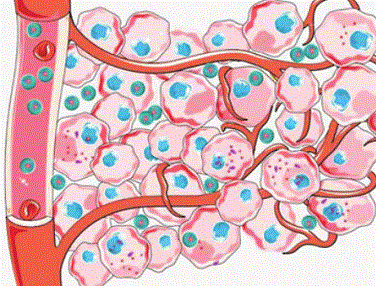Research | Chronic Disease | Global

Infusions of donor T cells to fight the cancer often fail, but sodium bicarbonate can counter lactic acid produced by leukemia cells, potentially improving remission rates in mice and humans.
Patients with acute myeloid leukemia who relapse after stem cell transplantation have just a small chance of survival: doctors can give them additional donor T cells to fight the cancer, but only about 20 percent of patients go back into remission. Scientists didn’t know why these T cells aren’t working against AML, but a paper published in Science Translational Medicine on October 28 uncovers the mechanism, as well as a simple, inexpensive treatment that can reactivate them: sodium bicarbonate, otherwise known as baking soda.
“This is an elegant study,” says physician-scientist Nataliya Buxbaum, who researches T cell metabolism at the National Cancer Institute and who wasn’t involved in this study. “Relapsed AML is very difficult to treat, so if something rudimentary, like sodium bicarb, which is available at every hospital, can augment the immune response, it’s certainly interesting.”
AML is a disease that attacks the blood-forming cells of the bone marrow, and physicians treat it with chemotherapy to kill the leukemia cells. But if a high dose of chemotherapy is required, it can destroy the bone marrow, and the patient will need a stem cell transplant to generate new blood-forming and immune cell–forming cells. The donor T cells from the transplant recognize the leukemia cells as foreign and attack them, a phenomenon known as graft-versus-leukemia effect, which, along with the chemotherapy, can send the patient into remission.
If the leukemia comes back even after these procedures, patients can receive a donor lymphocyte infusion of additional T cells, but it is rarely successful. Robert Zeiser, a transplant physician at the University of Freiburg in Germany, wanted to see whether leukemia cells alter T cell function, so he examined T cells from patients with AML after stem cell transplantation, when the AML was in remission, and after subsequent relapse. He found that relapsed patients’ T cells had reduced glycolysis and oxidative phosphorylation, and less cytotoxicity. In other words, their metabolism and ability to kill other cells was diminished.
Zeiser moved his experiments into AML mouse models, where he found that genes involved in glycolysis were down-regulated in mouse T cells cultured with AML; the cells also had reduced metabolic fitness and proliferation. Transferring T cells previously exposed to AML into AML mice couldn’t get rid of the leukemia, whereas T cells not exposed to AML did attack the leukemia, showing that AML cells release some factor that reduces T cells’ ability to fight leukemia.
More details can be found at https://www.the-scientist.com/news-opinion/baking-soda-boosts-t-cells-ability-to-fight-leukemia-68120

